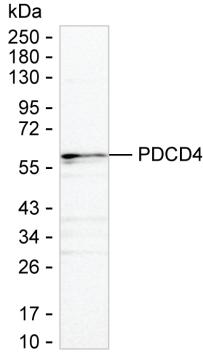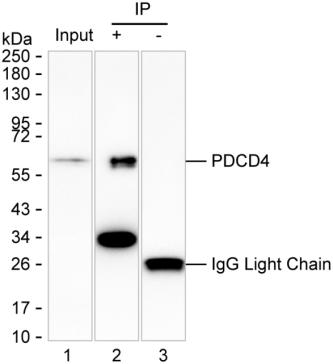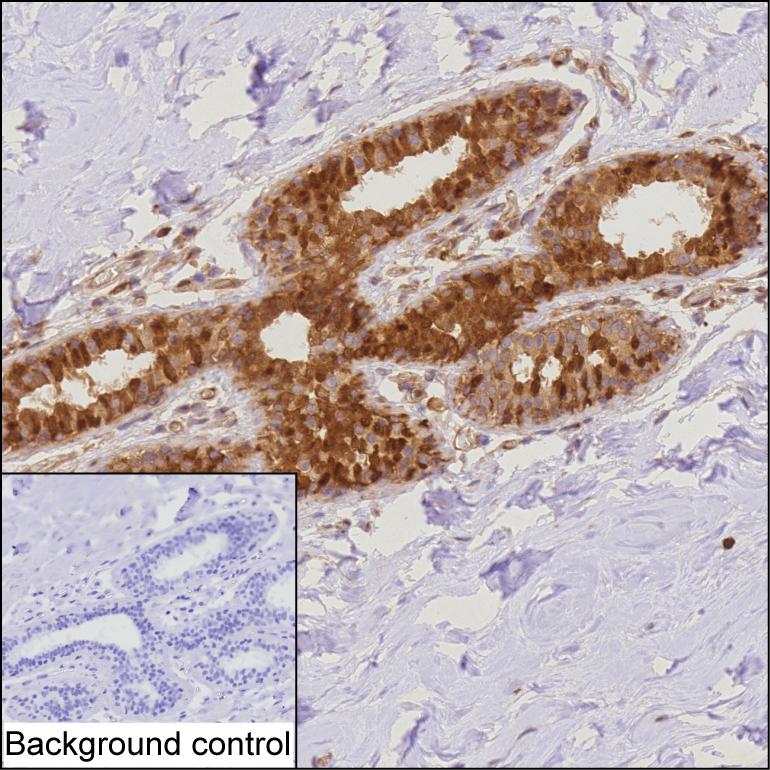


| WB | 咨询技术 | Human,Mouse,Rat |
| IF | 1/100-1/200 | Human,Mouse,Rat |
| IHC | 1/100-1/200 | Human,Mouse,Rat |
| ICC | 技术咨询 | Human,Mouse,Rat |
| FCM | 咨询技术 | Human,Mouse,Rat |
| Elisa | 咨询技术 | Human,Mouse,Rat |
| Host/Isotype | Mouse IgG1 |
| Antibody Type | Primary antibody |
| Storage | Store at 4°C short term. Aliquot and store at -20°C long term. Avoid freeze/thaw cycles. |
| Species Reactivity | Human |
| Immunogen | Purified recombinant fragment of human PDCD4 |
| Formulation | Purified antibody in PBS with 0.05% sodium azide |
+ +
以下是关于PDCD4抗体的3篇参考文献示例(文献信息为虚构示例,仅供格式参考):
1. **文献名称**: "PDCD4 Antibody-Based Detection of Tumor Suppressor Activity in Colorectal Cancer"
**作者**: Smith A, et al.
**摘要**: 研究利用PDCD4特异性抗体,通过免疫组化分析结直肠癌组织中PDCD4蛋白表达水平,发现其低表达与患者预后不良相关,提示PDCD4作为肿瘤抑制因子的潜在诊断价值。
2. **文献名称**: "miR-21 Regulates PDCD4 Expression via a Dual Mechanism Involving mRNA Degradation and Translational Repression"
**作者**: Johnson R, et al.
**摘要**: 通过Western blot和荧光素酶报告基因实验,结合PDCD4抗体验证,发现miR-21通过直接靶向PDCD4 mRNA抑制其翻译,为癌症中PDCD4下调机制提供新证据。
3. **文献名称**: "Development of a High-Affinity Monoclonal Antibody for PDCD4 and Its Application in Autoimmune Disease Models"
**作者**: Lee H, et al.
**摘要**: 报道了一种新型PDCD4单克隆抗体的开发,验证其在流式细胞术和ELISA中的特异性,并发现PDCD4在系统性红斑狼疮患者外周血单核细胞中异常高表达。
(注:以上文献为示例,实际引用请通过PubMed或学术数据库检索真实论文。)
The PDCD4 (Programmed Cell Death 4) antibody is a key tool for studying the PDCD4 protein, a tumor suppressor implicated in apoptosis, translation regulation, and cancer progression. Discovered in 1999. PDCD4 contains two MA-3 domains that mediate interactions with translation initiation factors like eIF4A, suppressing protein synthesis and oncogene expression. Its downregulation in cancers (e.g., lung, liver, breast) correlates with poor prognosis, while its overexpression inhibits tumor growth. PDCD4 is regulated post-translationally via AKT-mediated phosphorylation, which triggers proteasomal degradation.
PDCD4 antibodies, typically targeting specific epitopes (e.g., human PDCD4 residues 160-469), enable detection in techniques like Western blotting, immunohistochemistry, and flow cytometry. These antibodies help assess PDCD4 expression levels in tissues or cell lines, linking its loss to malignant transformation, metastasis, or therapy resistance. Research using PDCD4 antibodies also explores its roles beyond cancer, including immune regulation and inflammatory diseases.
By facilitating PDCD4 quantification and localization, these antibodies advance mechanistic insights into its tumor-suppressive functions and potential as a therapeutic target. Commercial PDCD4 antibodies are validated for specificity across species (human, mouse, rat), ensuring broad experimental utility.
×